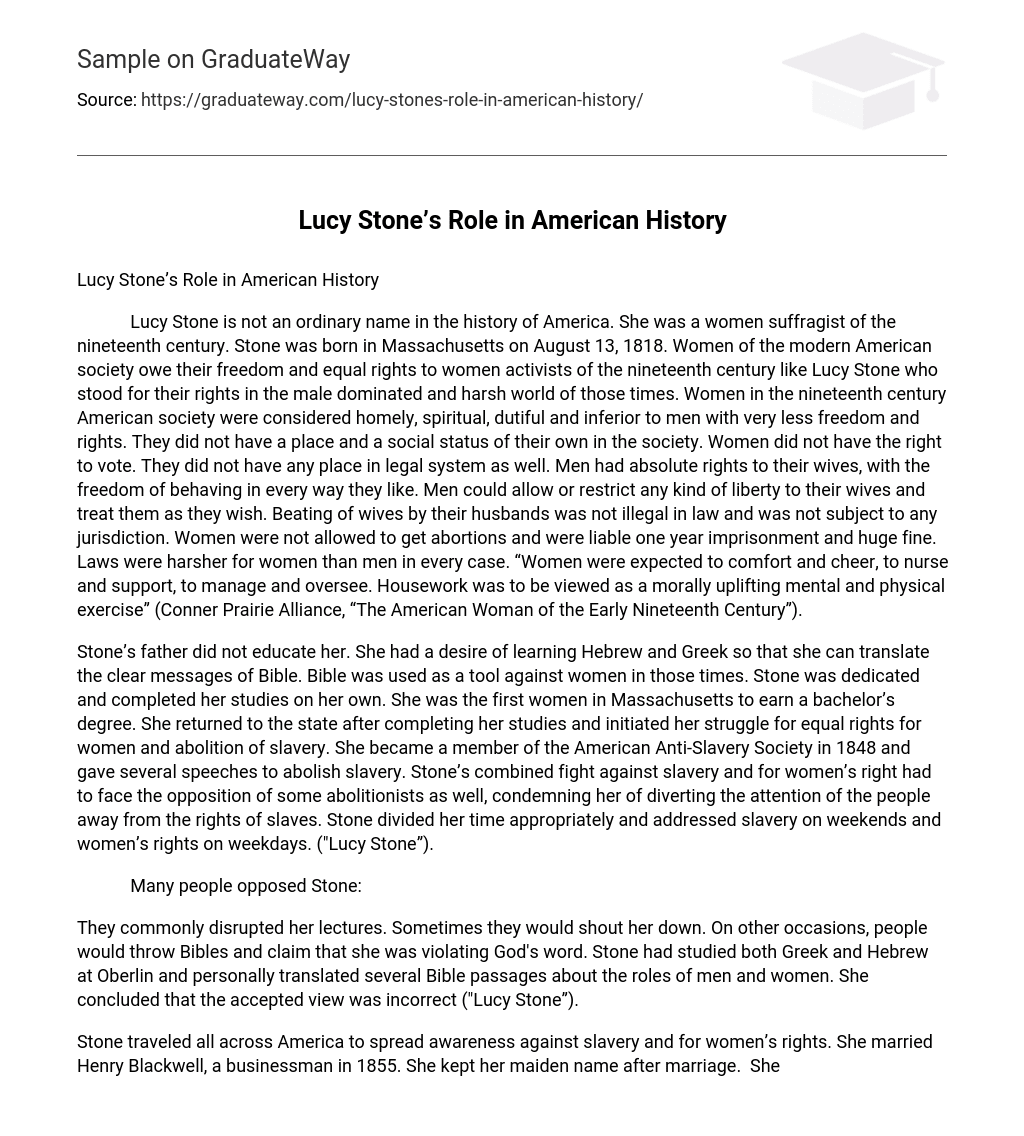Lucy Stone is not an ordinary name in the history of America. She was a women suffragist of the nineteenth century. Stone was born in Massachusetts on August 13, 1818. Women of the modern American society owe their freedom and equal rights to women activists of the nineteenth century like Lucy Stone who stood for their rights in the male dominated and harsh world of those times. Women in the nineteenth century American society were considered homely, spiritual, dutiful and inferior to men with very less freedom and rights. They did not have a place and a social status of their own in the society. Women did not have the right to vote. They did not have any place in legal system as well. Men had absolute rights to their wives, with the freedom of behaving in every way they like. Men could allow or restrict any kind of liberty to their wives and treat them as they wish. Beating of wives by their husbands was not illegal in law and was not subject to any jurisdiction. Women were not allowed to get abortions and were liable one year imprisonment and huge fine. Laws were harsher for women than men in every case. “Women were expected to comfort and cheer, to nurse and support, to manage and oversee. Housework was to be viewed as a morally uplifting mental and physical exercise” (Conner Prairie Alliance, “The American Woman of the Early Nineteenth Century”).
Stone’s father did not educate her. She had a desire of learning Hebrew and Greek so that she can translate the clear messages of Bible. Bible was used as a tool against women in those times. Stone was dedicated and completed her studies on her own. She was the first women in Massachusetts to earn a bachelor’s degree. She returned to the state after completing her studies and initiated her struggle for equal rights for women and abolition of slavery. She became a member of the American Anti-Slavery Society in 1848 and gave several speeches to abolish slavery. Stone’s combined fight against slavery and for women’s right had to face the opposition of some abolitionists as well, condemning her of diverting the attention of the people away from the rights of slaves. Stone divided her time appropriately and addressed slavery on weekends and women’s rights on weekdays. (“Lucy Stone”).
Many people opposed Stone:
They commonly disrupted her lectures. Sometimes they would shout her down. On other occasions, people would throw Bibles and claim that she was violating God’s word. Stone had studied both Greek and Hebrew at Oberlin and personally translated several Bible passages about the roles of men and women. She concluded that the accepted view was incorrect (“Lucy Stone”).
Stone traveled all across America to spread awareness against slavery and for women’s rights. She married Henry Blackwell, a businessman in 1855. She kept her maiden name after marriage. She stopped giving lectures in 1857 for the sake of her newborn daughter. Stone retained her public addresses in the late 1860s (“Lucy Stone”).
The fourteenth and the fifteenth amendments gave rights like equal protection under law and suffrage respectively to African-American men but women were yet to realize their equality. Lucy played an important role in founding the American Woman Suffrage Association (AWSA). Other prominent activists like Elizabeth Cady Stanton and Susan B. Anthony founded the National Woman Suffrage Association (NWSA). Both these associations merged into one afterwards. Stone’s husband was a great support for her and her efforts. To spread her cause Stone became the editor of ‘The Women’s Journal’ along with her husband. It was a weekly newspaper that supported the cause of women’s rights. A breakthrough came her way when women were allowed to vote for school board members in Massachusetts but Stone was not granted her right to vote since she had retained her maiden name after marriage. Since Stone was not willing to change her surname to her husband’s she could not vote. Stone died in 1893. Her dream of national women suffrage took 23 years after her death to come true (“Lucy Stone”).
Works Cited
Conner Prairie Alliance. “The American Woman of the Early Nineteenth Century”. connerprairie.org. August 14, 2008 <http://www.connerprairie.org/HistoryOnline/womrole.html>
“Lucy Stone”. ohiohistorycentral.org. July 1, 2005. Ohio History Central. August 14, 2008 <http://www.ohiohistorycentral.org/entry.php?rec=359>





